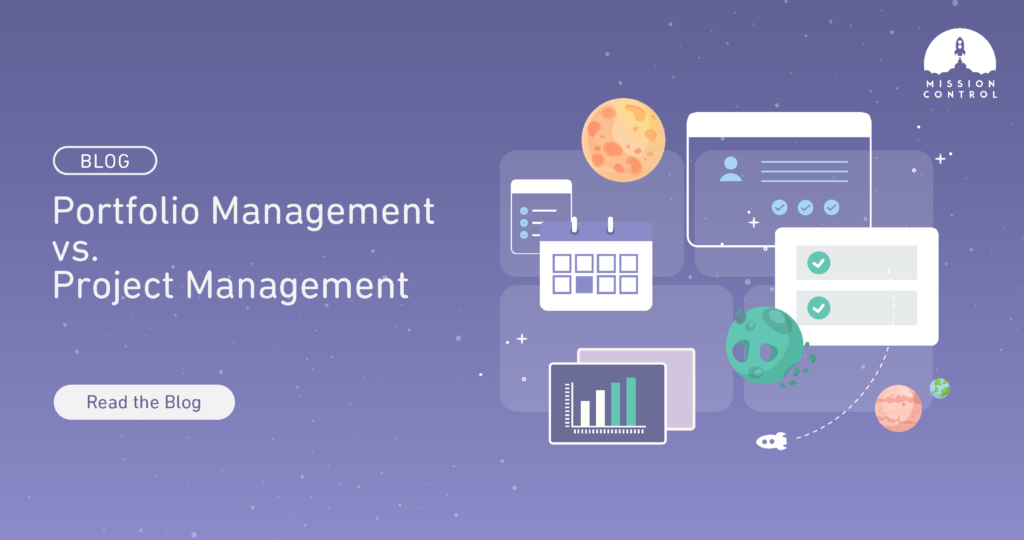Portfolio management and project management are often used interchangeably in the business world. While the two practices are similar, they have distinct meanings with key differences.
Learn more about portfolio management vs. project management, why they’re beneficial, and how you can use these practices to plan, manage and execute successful projects.
What Is Project Portfolio Management?
Project portfolio management (PPM) involves managing a collection of projects aimed at achieving specific corporate objectives. This collection of projects is referred to as a portfolio. An organization can have one or multiple projects depending on its goals. A portfolio manager spearheads project portfolio management.
With project portfolio management, organizations can determine which projects are more likely to contribute to the organization’s overall goals. To achieve this, project portfolio management ensures that projects are aligned to specific objectives, resources are efficiently optimized, and projects are prioritized objectively.
Portfolio management aims to improve project execution and accelerate an organization’s growth. Portfolio managers are instrumental in offering the organization direction by setting priorities based on the business leadership’s objectives.
Portfolio managers take a top-down approach when determining which projects to work on. In this approach, the organization prioritizes important, less risky projects. Teams use the remaining resources for additional initiatives.
Portfolio managers also regularly revise selected projects to make sure that only the projects with the highest business value remain the top priority. Should a portfolio manager realize that a particular project no longer aligns with the company’s strategy, portfolio managers have the authority to remove it. Doing so helps save time and unnecessary expenditure and channels resources to high-priority projects.
What Is Project Management?
Project Management Institute (PMI) defines project management as:
“the use of specific knowledge, skills, tools, and techniques to deliver something of value to people.”
While project portfolio management focuses on delivering a group of projects, project management focuses on delivering individual projects. In project management, a business project is temporary work with a start and end date and focuses on a unique outcome (a new product or service). A project manager spearheads this business process.
Project management aims to ensure that projects are delivered on time and within budget and that the results meet set objectives. This is often achieved by implementing project management best practices, examining processes to improve efficiency, and working with stakeholders to make sure expected outcomes are produced, among other responsibilities.
Portfolio Management Vs. Project Management: How Are They Different?
Even though the line between project portfolio management and project management can seem blurry, there are several key differences between the two processes.
- Projects are temporary with a defined start and end date, while portfolios are ongoing initiatives (no specified end date) that involve strategic objectives. Once a project deadline has passed, teams will usually move on to a new project. Portfolios, however, can span for years depending on the overall objective.
- Project management is about executing the projects correctly, while portfolio management is all about executing the right projects that bring the highest value. Project management aims to complete a project on time, while portfolio management aims to maximize ROI and achieve business goals.
- Project management focuses on a single objective (a new product line or service), while portfolio management deals with multiple projects that result in company-wide benefits like improved ROIs.
How Does a Portfolio Manager Differ From a Project Manager?
Since portfolio management and project management approaches involve different goals and strategies, portfolio managers and project managers have entirely different responsibilities.
Portfolio manager
The primary responsibility of a portfolio manager is to ensure that their organizations focus on the right projects. Many businesses don’t have the capacity to take on a large number of projects each year. So portfolio managers must choose projects with a high strategic return. They do this by inspecting each project individually to determine if it aligns with the company’s long-term goals.
Other common tasks a portfolio manager may be in charge of include:
- Capacity planning. A portfolio manager plans and manages project resources to ensure that all projects have the resources they need to be completed successfully.
- Introduction and maintenance of project management methodologies that create consistency and efficiency while managing projects across the organization
- Continuous monitoring and evaluation of project progress.
- Assisting in resolving conflicts and removing bottlenecks for all project teams.
- Helping project managers advance their project management skills.
- Ensuring tasks are completed on schedule.
- Assessing portfolio performance and each project’s contribution to the company’s overall objectives.
- Looking for methods to improve projects.
Project manager
A project manager oversees an individual project’s planning, execution, and management. They work hard to complete projects on time and within budget. Other project manager responsibilities include:
- Defining project goals, objectives, and expected outcomes.
- Prioritizing and assigning tasks and responsibilities to project team members.
- Communicating project milestones to the team.
- Keeping track of project timelines and the set milestones to make sure the project adheres to the timeline, budget, and requirements.
- Monitoring the project’s risks and using risk management tools to mitigate risks.
- Managing and updating the team and other key project stakeholders to make sure they’re up-to-date on project progress and that everyone is working towards the same goal.
Why Companies Use Portfolio Management
For a company that’s running multiple projects simultaneously, implementing project portfolio management ensures that these projects work together perfectly and efficiently.
Portfolio management is also beneficial to companies with multiple projects and limited resources. It helps determine which projects have potential ROI and channel resources there and pull the plug on projects with little return.
Portfolio managers help businesses to focus on the big picture and ensure that all projects are aligned with that vision.
Manage Portfolios and Projects Successfully with Mission Control
Whether your business chooses project management or portfolio management (or both!), using a project management tool such as Mission Control will make the process easier and more efficient.
Mission Control has customizable features to help you plan, strategize, and manage basic projects or complex portfolios.
You can manage multiple projects from one dashboard, making monitoring each project’s progress easier. Having all your projects managed on one platform also makes it easier to track all tasks and always be aware of who is working on what.
Mission Control stores all your project data in one central place, making sharing and accessing information a breeze. Both project and portfolio managers can quickly communicate with stakeholders and update changes in real time on the platform.
Mission Control’s capabilities are endless, and these are just a few.
Request a demo to see more ways Mission Control can help your organization manage its projects efficiently!




